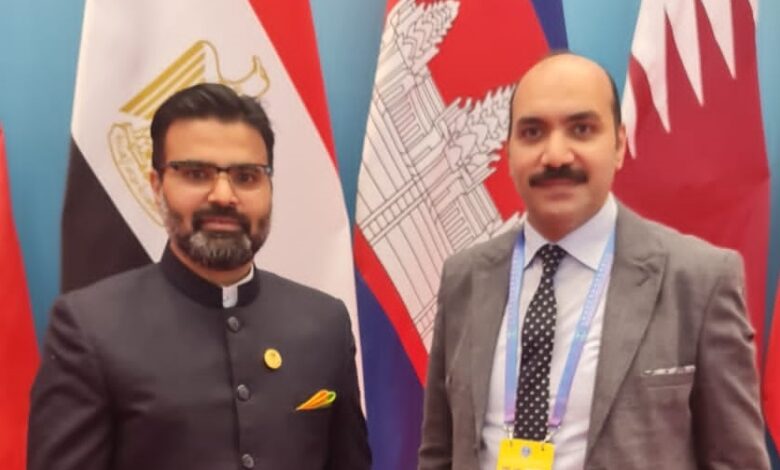
In an exclusive interview, the Deputy Secretary-General of the Shanghai Cooperation Organization (SCO), Shri Janesh Kain, said that Egypt plays a major role in the organization as a dialogue partner and is a pillar of stability in the Middle East.
The organization, with member countries totaling 3.5 billion people, works to strengthen political security, he said, alongside combating international and cross-border crimes, as well as confronting the challenges of climate change.
During the sidelines of the Green Development Forum of SCO countries in Qingdao, Shandong Province, he explained that the volume of trade exchange between countries exceeded US$650 billion, and there are efforts to use national currencies for trade purposes and investment, but it is not moving at a fast pace.
- What is the role of the Shanghai Cooperation Organization?
The SCO was established for the purpose of enhancing mutual trust, friendship and promoting multifaceted cooperation in maintaining and promoting peace, security and stability in the region.
It also seeks to jointly respond to new challenges and threats, promote effective and mutually beneficial cooperation in various fields, as well as encourage economic growth and social and cultural development.
- What is the number of member states now after Belarus joined, and how do you see Egypt’s role?
The SCO family presently consists of 26 countries, 10 member states, two observer states, and 14 dialogue partners including Egypt, whose role in the organization we are proud of.
With member states of a combined population of more than 3.5 billion people – nearly half of the world – it is a relatively young organization that has already made great achievements.
The organization plays an important role in international political security mainly in promoting mutual political trust and security cooperation among member states on the basis of the “Shanghai Spirit.”
We work to strengthen regional security and jointly address threats such as terrorism, separatism and extremism through the exchange of intelligence information, joint training and combating transnational crimes.
The organization actively participates in international affairs and establishes dialogue and partnership with other international organizations to jointly solve global problems.
It is also committed to promoting regional peace and stability and resolving international and regional issues through political and diplomatic means,
It further plays an important role in maintaining international political security and promoting mutual political trust and cooperation.
It is an organization dedicated to improving the living standards of the citizens of its member states, and at present, is actively working in key economic areas such as energy, transportation, industry, finance and digital technology.
- In your opinion, what measures have been taken by the Shanghai Economic Cooperation Development Organization?
The member states of the SCO are making active efforts to increase trade and economic cooperation under the framework of the Council of Heads of State of the Member States of the Organization and the Council of Heads of Government, alongside other mechanisms.
A number of initiatives are being developed and adopted to contribute to the economic development of its member states.
Starting from July 2023 at the SCO Summit, the organization’s economic development strategy up to 2030 was approved, which includes intensifying cooperation between member states in the trade, economic, technological and financial fields, ensuring security and sustainable development.
In 2023, the trade volume between the member states of the SCO reached more than $650 billion – 29 percent more than in 2022.
The SCO therefore constitutes an important tool for strengthening relations between countries in the region, which helps the organization increase trade and economic potential and creates favorable conditions for the development of entrepreneurship.
Thanks to a balanced policy that takes into account the interests of all members, the SCO successfully implements its mission of building peace, stability and prosperity in the region.
- This year, the organization’s ecology plan was announced. What does caring for the environment mean?
The Year of Environment initiative of the SCO places great practical importance in confronting current global environmental challenges related to climate change and its devastating repercussions.
The main goal of the initiative is to draw the attention of the international community to the environmental problems facing the organization, and the activities of the SCO in the environmental field.
The SCO Secretariat held a youth conference entitled “Towards a Green Economy: The SCO’s Regional Sustainable Development Strategy on Global Climate Change” in order to discuss finding common solutions to challenges and threats.
The theme of this year’s session of the SCO Youth Council is also the environment – “Youth Leadership in the Ecological Environment: The Path to a Stable Future for the Organization.”
The approved document stipulates the establishment of an international headquarters for environmental volunteers, the organization of annual competitions for environmental projects.
During Kazakhstan’s presidency of the SCO, active measures have been taken to enrich the SCO’s environmental agenda with productive and high-quality content to implement the Joint Action Plan for the Implementation of the SCO Green Belt for 2024-2026, and the Action Plan for the Implementation of the Environmental Cooperation Concept of Member States.
- What about cooperation in the field of natural reserves?
A few days ago, the Agreement of Governments of the Member States of the SCO on Environmental Cooperation, the Program for Cooperation in the Development of Protected Areas (Special Nature Reserves, Nature Reserves) and Ecotourism in the Member States of the SCO was approved, and the Council of Heads of Member States of the Shanghai Cooperation Organization adopted a statement on Effective Waste Management.
The documents reflect issues of policy coordination, scientific and technological cooperation, education and training, exchange of information and experience, green development in environmental protection and control, environmental safety, biodiversity conservation, climate change and waste management.
In general, the member states of the SCO are firmly committed to sustainable development and places great importance on protecting the environment, environmental security, climate change and environmental management.
- Does the organization have the cultural interests of member states and dialogue partners?
The authority and influence of the SCO is constantly strengthening and growing thanks to its successful and open activities.
In addition to observer countries and partners, we continue to receive applications to join the SCO.
Implementing joint activities in culture and art helps enhance mutual understanding between peoples, preserve the diversity of cultures, and spread knowledge about the cultures of the world.
The SCO’s member states also support continuing to improve cooperation with observer states and dialogue partners in culture and art both bilaterally and multilaterally.
The organization’s strategy until 2025 stipulates that member states are interested in ensuring internal peace between races and religions, promoting traditions of harmonious coexistence between different nationalities and religions, and developing dialogue among cultures with the participation of all parties, be they observer states in the SCO and dialogue partners, whenever flexible plans allow.
For events held by the SCO for observer states and dialogue partners to participate in cultural and people-to-people cooperation.
- Many countries are looking into cooperation in local currencies. What is new about it?
The SCO’s member states seek to use their national currencies for trade and investment purposes.
This issue has been discussed at different levels for some time. Since 2022, SCO member states have formed a group of experts on implementing the roadmap to gradually increase the share of national currencies in accounts.
It was adopted at the Samarkand Summit in 2022, with all parties working under a road map to create conditions for the operation of the system and facilitate the settlement of payments between member states in their national currencies.
However, this is a complex issue that involves many different aspects, including the use of national currencies for trade settlement and to encourage investment.
There are many legal issues to overcome and the need to build a digital and financial infrastructure to implement such a complex system.
We have to not only integrate all systems into one, but also develop a legal basis for regulating trade and investment.
The organization works on the basis of consensus, so in order to make progress on this or any other issue, it is important to unite the efforts of all parties.
Given the complexity and scale involved, discussions are taking place and progress is being made at a pace that may not be as fast as we would like, but there will be positive results in the future.




